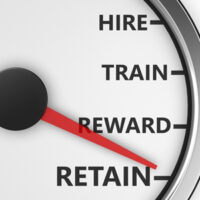
Self-help books have played a substantial role in both my personal and professional growth. I genuinely enjoy reading about positive mindsets, optimism and never-ending learning. My passion for the genre started when I read the quote by Mahatma Gandhi, “Live as if you were to die tomorrow. Learn as if you were to live forever.” In addition, I just like all the smiling faces on the covers of self-help books. Come on, smiling is contagious!
After extensive research, successes and failures as a staffing expert and in life, I have learned a few universal truths. One universal truth is that we are all motivated to seek meaning and a higher purpose. Maslow’s hierarchy of needs states that self-actualization is a fundamental human need.1 Another universal truth is that self-awareness and self-reflection are invaluable qualities that we all must learn and cultivate. Furthermore, it is a universal principle that the most successful people plan, execute and recalibrate. They never stop because they are goal-oriented.2 My preferred self-help books (sometimes called wisdom books or success literature) provide different insights into these universal truths with practical ways to use them. For instance, purpose, self-awareness and being goal-oriented are essential to planning the trajectory of your career. In 2019—at whatever stage of life you are in—let us use these universal truths to plan and execute your audacious goals.
It is Not About the How or the What but the Why and the Who
One reason New Year’s resolutions fail 90.8 percent3 of the time is because they are trite and demotivating, have no personal connection to who we are and what excites us, and are just words written down without any objectives or guidance. The other reason they fail is because they are contrived; we feel an inherent connection between one year turning into the next and turning into someone new overnight. If you choose to write career goals for 2019, make sure that list represents you. I have to emphasize that because we have a tendency, as humans, to compare ourselves to others. We compare the things we own, our job titles, our experiences, our physical looks and appearances, and on and on. In turn, some goals are based on external factors that do not tap into our identities and values and do not provide sustainable motivation. Failing at goals could lead to falling into a vicious negative cycle in which we focus on how poorly things are going, we become discouraged at taking on new projects or goals, and the cycle repeats. We grow pessimistic and resentful and blame others for our setbacks. Robin Sharma, a career and life coach, says, “Truly successful people never seek to be like others. We must define how [we want] to live and [what our] biggest life will look like.”4 Create a written statement of your personal philosophy so your life is not lived by accident.5
When creating or amending career goals for 2019, remember that you are capable of doing everything you care about and with which you have an emotional connection. Sharma suggests using the following technique,
“…technique of creative questioning to become aware of the impact your work has on the world around you. Ask yourself questions like, who ultimately benefits from…my [services]? [Or] What differences do my daily efforts make? You will start noticing…the lives you touch. This will inspire you.”6
Purpose and self-awareness should be the backbone of your career goals. How can you instill or develop more meaning in your life through your career? What are you lacking at the moment that will make you better at your job? What skills can you enhance to continue to positively impact your colleagues and the world? The next step is making sure you construct your goals with precision.
In The Progress Principle, the authors discuss the human need for self-efficacy. A person needs to believe “that he or she is individually capable of planning and executing the tasks required to achieve the desired goal.”7 What the task is and how we decide to complete it are important. We have policies, procedures and food recipes for a reason. However, the most menial and tedious of duties and activities always have more significance when we understand the meaning behind them. If an analyst takes pride in protecting their community as a frontline defender against terrorist financing or predatory lending, then enhanced due diligence/customer due diligence remediation and Home Mortgage Disclosure Act reviews take on a whole new light. The analyst’s pride is now an emotional trigger that turns motivation to inspiration.8 When you are inspired, you will take on difficult responsibilities and goals with dedication and resoluteness, which will reinforce and affirm one’s self-efficacy. The beauty of purpose and meaning is that you do not have to leave your current job to go find your passion. All you have to do is make the decision to be the best at everything you do and give yourself purpose.9 To cultivate self-efficacy, always think about who you are and why you do what you do.
The Goal of Goals
We are lucky that successful people have made goal setting a science. Goals are an end result, which can be compared to a mission statement. However, you cannot meet your goals and accomplish your mission without having strategic objectives. Objectives legitimize goals by providing detail into what you will have to do.10 Peter Drucker, a management and business guru, established the five qualities that objectives must have. When you sit down to plan your career goals for 2019 and beyond, make sure you are honest with yourself by following the SMART test. The SMART test will determine whether your objectives will be effective.
- Specific: The objective has to be “narrowly defined.”11
- Measurable: Establish a way of measuring both intangible and tangible objectives.12
- Attainable: Is the objective both challenging but “within reach given effort and the right tools and support”?13
- Relevant: Does the objective, if completed, actually help attain the goal?
- Timely: The objective has to be completed with a “defined time frame.”14
Goal setting is not easy. You will need time, determination and clarity to create your career goals. However, the more diligence and effort you put into your strategy and objectives, the more emotionally attached you will become to executing the plan. You will become intrinsically motivated, which will give you stronger defenses against the bad days and setbacks that are inevitable when you strive for what you want. Ultimately, you will not only attain your goal, but you will also become more confident in your abilities to attack even harder goals and challenges. You will create a self-propagating cycle in which you become a better version of yourself.
Words of Wisdom
2019 is going to be your year. Stephen Covey, author of The 7 Habits of Highly Effective People, says, “An effective goal focuses primarily on results rather than activity.”15 We all have our to-do lists that remind us to pick up the dry cleaning or finally make that overdue doctor’s appointment. 2019 is going to be your year because you will discover—and constantly remind yourself of—the person you want to be and the people, activities and roles that are truly important to you. If you are getting sick and tired of never fulfilling your New Year’s resolutions, or are losing faith in self-help books that push useless platitudes and busybody activities, then you should begin 2019 with a paradigm shift. Instead of creating goals first, reflect on your values, purpose, mission and your identity. Keep asking yourself questions that take you out of your comfort zone and compel you to candidly self-reflect and self-audit.
For example:
- Who and what is important to me?
- Do my actions prove that I consider those people and things important? If not, what do my actions and daily activities actually say about my priorities?
You will go down a rabbit hole of questions that will continue to give you more clarity. Do not stop until you confidently and consistently answer these questions with raw candor. You will need to set time away and put in the mental effort to conduct this activity. With your busy work schedule, children, family and community obligations, this could be a difficult task to complete. Take your time because self-awareness and establishing true values and principles will be your guide in the process of determining your career goals. Remember to document your answers and thoughts—in a journal for instance—so you can keep yourself accountable and observe how your goals and priorities evolve as your circumstances change.
I recommend that you create goals for different aspects of your life, such as your family, hobbies and friends. Likewise, your career goals should be based on the same foundation of values, priorities and self-awareness. We all need meaning, purpose and a sense of belonging to have genuine passion and self-motivation. Your career goals for 2019 have to coincide with who you are today and the person you aspire to become. If your goals do not have both qualities, then you will lose steam and determination; you will be creating another lifeless list of New Year’s resolutions. We also know that we cannot possibly focus on more than three or four substantial goals lest we spread ourselves too thin and fail at making headway on any of the goals.
Your career plays a major part in your life: it occupies a large amount of your limited time, provides a living for you and your family, and helps pay for many of the great experiences you will have. So, why not take as much control of your career as you possibly can. Treat your career as a work of art that is continuously developing.
Remember, the next 365 days represent the beginning of a plan and not a race against the clock. Determine your values, priorities and principles. Although they have the ability to change, our values are usually steadfast and act as a good foundation to build upon.
Here is a guide you can use to create your personal career goals for 2019:
- Start the process of documenting and writing down everything. Make a list of all the skills you can learn, new activities you can experience, challenges and directions in which you can go. For example:
- Hard skills: Learn a new spoken or computer language, system, software, etc.
- Soft skills: Become a better public speaker, communicator, leader, or writer.
- Promotions or trajectory: Work toward a new corporate title, ask for more and new responsibilities, or determine you want to change your department or industry.
- Projects: Start the positive self-propagating cycle of taking on and executing harder and harder deliverables.
- Relationships: Start, rebuild, enhance and increase your relationships at the office; attend more networking events.
- Obtain or change jobs: Create, reformat and share your resume with trusted colleagues, friends, recruiters and contacts; selectively apply to jobs and work on becoming a better interviewer.
- Reduce the list to the three (at most, four) primary goals that you can start working on immediately.
- Test and validate each of your primary goals based on the SMART test.16 Is the goal Specific, Measurable, Attainable, Relevant and Timely?
- Contemplate, determine and document how these goals will lead you to the next step in your career and how well they adhere to your values and desires. Consider this a quality assurance and control step.
- Are your goals big enough?
- Can you break them down into immediate steps, intermediate steps and long-term steps?
- Engage your family, friends, trusted colleagues, mentor, supervisor and company.
- Do they believe your goals are SMART? What is their opinion or advice?
- Ask them to help you stay accountable and focused. You can never attain your goals without help, emotional support and tough love.
- Align your goals, if possible and appropriate, with the goals of your team, department and company. Work is so much more rewarding and engaging when you can depend on your leaders and peers to support you. In addition, you will show your natural-born leadership abilities by executing your plan transparently. Navy SEAL teams have suggested ways of incorporating their tactics in the business world, “Establishing an effective and repeatable planning process is critical to the success of any team.”17
- For each goal:
- Determine the first step. Use the gym principle: Eighty percent of the battle is just showing up.
- Will you need an instructor or coach if you are learning a new skill?
- Will you join a professional organization or tap into resources at your current job to become a mentor?
- If on the job search, how will you change your activities and find new resources to land that dream job?
- Deconstruct the strategy into objectives. Create immediate objectives, intermediate objectives and long-term objectives. You did not create and design your goals to be active for the sake of being active. You have big results in mind that will take time and a strategy to execute. You can cultivate and maintain your sustainable motivation by structuring your strategy into a collection of small wins and objectives.
- Take the first step.
- Constantly and consistently, look at your documented strategy and objectives.
- Measure your progress.
- Assess the goals; are they still relevant or important to you?
- Do your objectives still lead you to executing the overall strategy?
- Restructure your plan, if necessary.
- Determine the first step. Use the gym principle: Eighty percent of the battle is just showing up.
We cannot forget one timeless cliché, “plan the work, and then work the plan.”18 I cannot emphasize enough that adaptability and nimbleness are vital to staying in control of what you actually can oversee. The Harvard Business Review says that conventional career planning “can lead you into a false sense of confidence, where you fail to see opportunities as they arise and miss taking smart steps you otherwise hadn’t planned for.”19 Basing your career plans on your fundamental desires, values, principles and personal identity will not only keep you aware of the direction you are going in, but will also allow you to constantly adapt your plan without making you feel like you failed. Successful people seem to have resilience and grit, and they are always planning, executing and recalibrating. I will leave you with one of my favorite quotes from Zig Ziglar, a sales guru that makes me smile every time: “People often say motivation doesn’t last. Neither does bathing—that’s why we recommend it daily.”20
- Society for Human Resource Management, 2016 SHRM Learning System: People, 2016.
- Lindsay Tigar, “Don’t wait for New Year’s: Why you should be setting your goals now,” Fast Company, September 21, 2018, www.fastcompany.com/90234239/dont-wait-for-new-years-why-you-should-be-setting-your-goals-now
- Julie Christopher, “Why Most New Year’s Resolutions Fail and What You Should Do Instead,” Entrepreneur, January 15, 2018, https://www.entrepreneur.com/article/306400
- Robin Sharma, Daily Motivation From The Monk Who Sold His Ferrari, October 2, 2007.
- Ibid.
- Ibid.
- Teresa Amabile and Steven Kramer, The Progress Principle: Using Small Wins to Ignite Joy, Engagement, and Creativity at Work, July 19, 2011
- Simon Sinek, Start with Why: How Great Leaders Inspire Everyone to Take Action, 2009.
Sinek goes into detail about the Golden Ratio and Golden Circle. Both concepts have a qualitative nature, but seem to objectively measure beauty and the reasons why we do what we do, respectively. I will go into more detail about this particular book in an upcoming article about literature I highly respect and suggest reading. - Robin Sharma, Daily Motivation From The Monk Who Sold His Ferrari, October 2, 2007.
- Society for Human Resource Management, 2016 SHRM Learning System: People, 2016.
- Society for Human Resource Management, 2016 SHRM Learning System: Strategy, 2016.
- Ibid.
- Ibid.
- Ibid.
- Stephen R. Covey, The 7 Habits of Highly Effective People, August 15, 1989.
- Society for Human Resource Management, 2016 SHRM Learning System: People, 2016.
- Jocko Willink & Leif Babin, Extreme Ownership: How US Navy SEALs Lead and Win, October 20, 2015.
- Numerous people have said this idea in some form: Norman Vincent Peale, Vince Lombardi, Margaret Thatcher, Napoleon Hill and Victor Hugo are just a few examples.
- Leonard A Schlesinger, “Why Career Plans Don’t Work,” HBR Ascend, https://hbrascend.org/topics/why-career-plans-dont-work/
- Kevin Kruse, “Zig Ziglar: 10 Quotes That Can Change Your Life,” Forbes, November 28, 2012, https://www.forbes.com/sites/kevinkruse/2012/11/28/zig-ziglar-10-quotes-that-can-change-your-life/#325649d226a0










